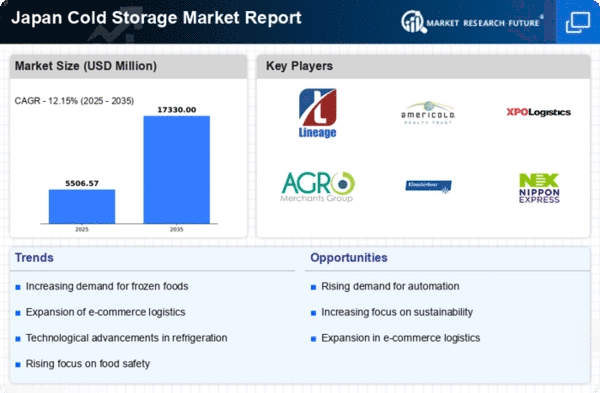Growth of Online Grocery Shopping
The rise of online grocery shopping in Japan is a notable driver for the cold storage market. As consumers increasingly prefer the convenience of purchasing groceries online, retailers are expanding their cold storage capabilities to accommodate this shift. Recent data suggests that online grocery sales in Japan are expected to grow by 25% annually, prompting retailers to enhance their cold storage infrastructure. This trend is reshaping the cold storage market, as businesses invest in temperature-controlled logistics to ensure the safe delivery of perishable goods. The growth of e-commerce in the grocery sector not only boosts demand for cold storage facilities but also encourages innovation in last-mile delivery solutions.
Rising Demand for Perishable Goods
The increasing consumption of perishable goods in Japan is a primary driver for the cold storage market. As the population becomes more health-conscious, there is a notable shift towards fresh produce, dairy, and meat products. This trend is reflected in the market data, which indicates that the demand for cold storage facilities has surged by approximately 15% over the past year. Retailers and distributors are investing in advanced cold storage solutions to ensure the freshness and safety of these products. Consequently, the cold storage market is experiencing significant growth, as businesses seek to enhance their supply chain efficiency and meet consumer expectations for quality and safety.
Government Regulations and Standards
The Japanese government has implemented stringent regulations regarding food safety and quality, which significantly influence the cold storage market. Compliance with these regulations necessitates the establishment of advanced cold storage facilities that meet specific temperature and hygiene standards. As a result, businesses are compelled to invest in modern cold storage solutions to adhere to these regulations. The cold storage market is thus experiencing a shift towards more sophisticated and compliant storage options. This regulatory environment not only ensures consumer safety but also drives innovation within the industry, as companies seek to enhance their operational capabilities to meet these standards.
Expansion of the Food and Beverage Sector
Japan's food and beverage sector is undergoing rapid expansion, which is significantly impacting the cold storage market. The sector's growth is driven by an increase in dining out and the popularity of convenience foods. According to recent statistics, the food service industry in Japan is projected to reach ¥20 trillion by 2026, necessitating a robust cold storage infrastructure to support this growth. As restaurants and food manufacturers require reliable cold storage solutions to maintain product quality, the cold storage market is poised to benefit from this upward trend. This expansion not only enhances the demand for cold storage facilities but also encourages innovation in temperature-controlled logistics.
Technological Innovations in Cold Chain Logistics
Technological advancements in cold chain logistics are transforming the cold storage market in Japan. Innovations such as IoT-enabled temperature monitoring systems and automated storage solutions are enhancing operational efficiency and reducing spoilage rates. The integration of these technologies is expected to increase the overall efficiency of cold storage facilities by up to 20%. As businesses strive to optimize their supply chains, the cold storage market is likely to see a surge in investments in these advanced technologies. This trend not only improves the reliability of cold storage solutions but also aligns with the growing emphasis on sustainability and waste reduction in the food supply chain.

















